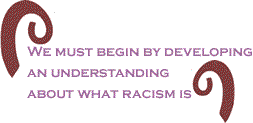The recent
Sherry Sharrod incident, where she was misrepresented (by
a Tea Party supporter) in an on-line video as being an African-American
racist against white people, and the ongoing anti-Mexican,
anti-immigrant legislation in Arizona have once again forced
the discussion of “race” and “racism” to the forefront of
media headlines. I am surprised at the tone of journalists
who act as though America has suddenly discovered that racism exists.
Now many mainstream journalist say that we need a dialogue
about race.

Race has been an issue
for America since its inception. People of color became
racially conscious as a result of systematic oppression.
“Race” is a social construct. This means that when America was born a group of people, from European
background, decided that they are superior to all other
people. They called themselves “white,” and made associations
of everything that is superior or good with whiteness. This
gave them a justification for the enslavement of Africans,
genocide of Native Americans, theft of Mexican lands, exploiting
Chinese labor, internment of Japanese Americans and much
more. This is how we became racially conscious.
There has always been
a dialogue about race in America, but it has
been hostile and has mostly been between oppressors who
wanted to maintain the status-quo and the oppressed who
wanted to change our nation. The dialogue has been represented
in the efforts of Southern Slave owners, the US occupation
army on Native people’s lands, White Citizens Councils,
KKK, Skin Heads, Nazis, southern segregationists, politicians
(in both parties) and in the rhetoric and actions of many
Tea Party activists, who have worked to maintain the second
class and oppressed status of people of color. On the other
side of the debate has been human rights and civil rights
activists who have worked to expand democratic and human
rights, fought for social justice, equality and self-determination.
 The
truth is that I learned about being brown from my own social
conditions. It wasn’t something I was introduced to in textbooks.
Even as a young child I understood that in the eyes of this
society that not being white was perceived as a deficit.
It meant existing in a second-class status. I experienced
discrimination, I knew I was expected to fail in school,
and I was always a suspect in the eyes of policemen. Once
I understood that racism is part of a system of oppression
I knew that I had to dedicate my life to ending racism. The
truth is that I learned about being brown from my own social
conditions. It wasn’t something I was introduced to in textbooks.
Even as a young child I understood that in the eyes of this
society that not being white was perceived as a deficit.
It meant existing in a second-class status. I experienced
discrimination, I knew I was expected to fail in school,
and I was always a suspect in the eyes of policemen. Once
I understood that racism is part of a system of oppression
I knew that I had to dedicate my life to ending racism.
How can race consciousness
help eliminate the hateful and toxic ideology and practices
of racism in America? Obviously it will take more than a simple
dialogue. This nation must fundamentally change how it treats
people of all every ethnicity and race. But we must begin
by developing an understanding about what racism is and
who benefits from it. I would offer the following book as
a starting point: The
Cost of Privilege: Taking On the System of White Supremacy
and Racism, by Chip Smith. I am also a contributor
to this book and believe it offers a complex analysis of
race in America.
[This commentary
was reprinted from Joe
Navarro:Poet.]
BlackCommentator.com
Guest Commentator, Joe Navarro, is
a 21st century Chicano activist teacher and poet. Click
here
to contact Mr. Navarro. |

